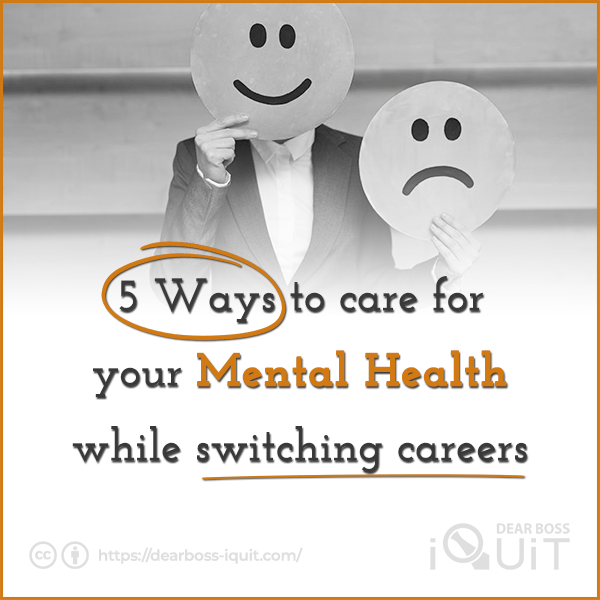If you’re looking to change your career, then you are not alone. According to a study conducted by Fidelity Investments, about 39% of employed Americans are considering a career change in 2022.
However, changing careers can take a hit on your mental health. Though the end result is usually positive, along the way you may encounter skeptics, backlash from your current employer, or crippling self-doubt. Other challenges that may affect your mental health include learning new skills, going back to school, or moving to a new location.
The good news is there are plenty of ways to care for your mental health while switching careers. Activities such as journaling, meditating, and regular exercise can keep your mood up during this stressful time.
Furthermore, talking to a professional and creating a support network will provide you with the motivation and positivity needed during this transition.
Whether you’re changing your career to enter a new field or just need to get away from your horrible boss, your mental health is going to play a key role in this transition. Let’s dive deeper into some ways you can care for your mental health while changing careers.
1. Talk With A Professional
Having a professional on your side can make a world of difference. Professionals who specialize in career changes can help to empower you, keep you motivated, and boost your confidence. They can also provide you with advice and clarity on how to achieve your career goals.
Professional help can take the form of a career coach, career counselor, or regular counselor or therapist. These professionals are all qualified to help you with the various aspects and challenges associated with career changes. These can include:
- Making important career decisions
- Finding a support network
- Dealing with skeptics
- Learning new skills
- Overcoming negative emotions such as anxiety, depression, or imposter syndrome
With so many in-person and online mental health services available finding a counselor or therapist is easier than ever. Many people have sought counselors or career coaches during their career transition and found much help and success through them. More and more, therapy and coaching are proving essential when pursuing career satisfaction, so these services should be utilized when considering a major career change.
You can also find some great professional advice on making career changes and other career-related topics at BetterHelp.
2. Find Supporters
When announcing your career change plans, you’re bound to run into a few naysayers. These people may try to talk you out of your ambitions due to jealousy or fear. It’s easy to listen to these folks and stop your progress towards your goals and dreams. However, it’s important to stay motivated despite the words of a few skeptics.
That’s why it is essential to find supporters in your life during this time. A solid support network will keep up your confidence and motivation as you face various setbacks, challenges, and criticism. When the journey gets tough, you need a few cheerleaders in your corner to keep you going.
There are plenty of ways to find supporters during your career transition. They can include, but are not limited to:
- Your partner
- Friends
- Family
- Supportive coworkers
- Social media groups
- Mentors
- Career coaches
3. Take Care of Your Physical Health
Your physical health and mental health are closely linked. When we don’t take care of our bodies, our mental health ultimately suffers.
When making a career change, you are already under much stress and strain. Therefore, you don’t want any added mental health challenges by neglecting your body. This is why it is crucial to exercise regularly and eat well during your career transition.
3.1 Exercise Regularly
Exercise in general has a positive effect on mental health. A 2018 study published in The Lancet found that participants who exercised regularly had 43% fewer days of poor mental health than those who did not exercise. Those added days of good mental health can keep you productive and motivated to achieve your career goals.
3.2 Consume a Nutritious Diet
Eating a nutritious diet full of fruits and vegetables can keep depression and anxiety at bay. A study by West Virginia University found that food insecurity and poor diets were significant predictors of depression and anxiety in their participants. The study concluded that improving the participants’ diets would significantly improve their mental health.
Although chronic stress may tempt you to reach for a doughnut or other carb-loaded meal, it is important to opt for more healthful options. Eating fruits and vegetables daily may be a significant factor in staying motivated and happy during your career change.
4. Meditate
Meditation has gained popularity in recent years, and for a good reason. Spending a few minutes meditating each day has been shown to have significant positive effects on mental health time and time again. In a 2016 study, 63.6% of participants said that regular meditation significantly improved their depression, anxiety, and chronic stress. If you’re in the midst of changing your career, there is a good chance you will encounter these three demons.
There are many forms of meditation available. Though most people are familiar with mindfulness meditation, there are other options available that may better suit your needs. Some of them include:
- Transcendental meditation
- Guided meditation
- Loving-kindness meditation
- Yoga meditation
- Mantra meditation
5. Journal
Writing your thoughts down with a pen and paper is a great way to keep track of your goals, limiting beliefs, and triggers. Journaling has brought clarity, direction, and peace to many people and can certainly help while you change careers.
You don’t have to do any complicated exercises to journal effectively. Simply writing down your trains of thought can be incredibly useful. Not only does this allow you to vent out any frustrations, fears, or worries, but analyzing your thoughts on paper can lead to some significant revelations.
Journaling is also helpful when making big decisions. When mulling over the pros and cons of a decision, it’s not usually beneficial to keep all those points inside your head. Writing them down helps you see the bigger picture more clearly, leading to improved, more thoughtful decision-making.
Conclusion
Your mental health is your most important asset when going through a career transition. Changing careers can be challenging and stressful, but the end result is often rewarding. By following these tips, you will be able to maintain your mental health and keep a positive mindset to achieve your career goals and dreams.


